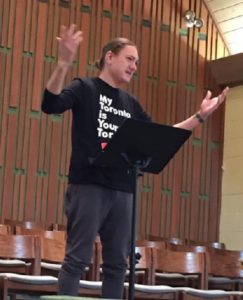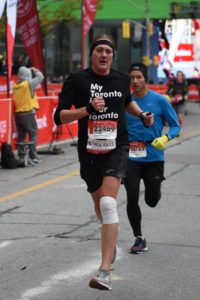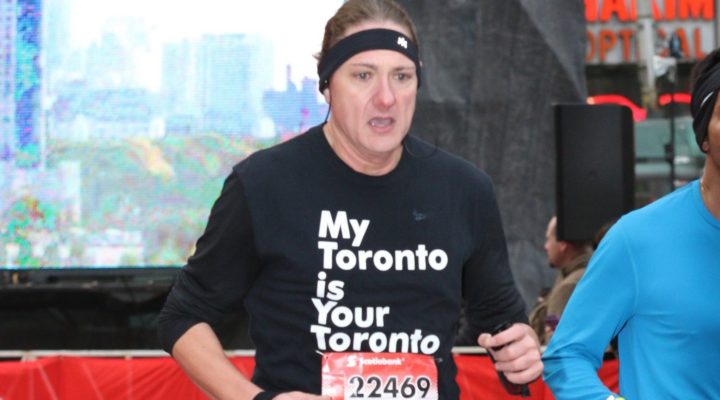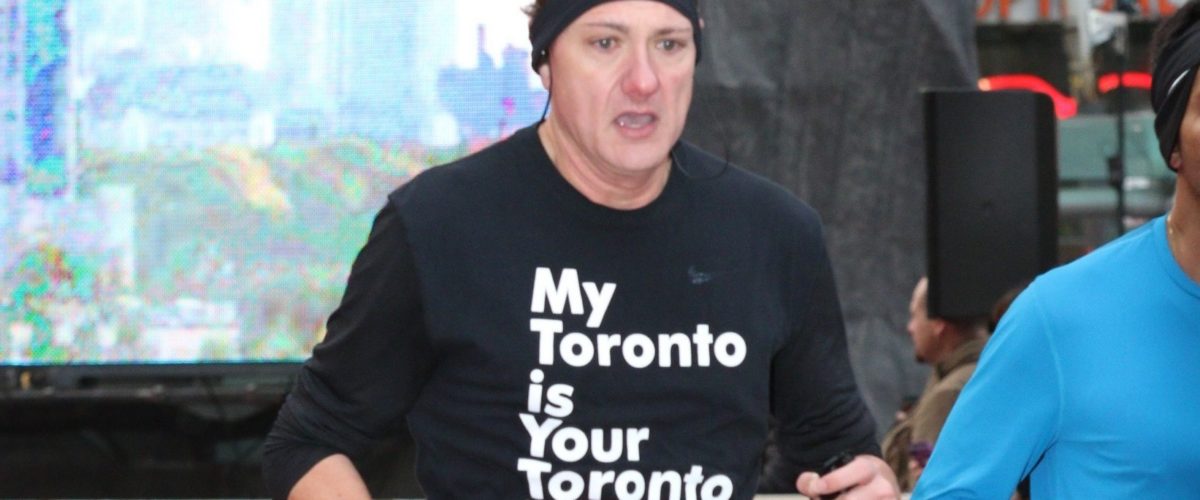Here’s what Baptist pastor Justin Joplin did on a recent Sunday: he ran a race at 8 a.m. then preached in his running clothes at 10 a.m.
And his church was OK with that.
“It was pretty cool,” Joplin said.

Justin Joplin preaches at Lorne Park Baptist Church shortly after running a 5K for charity.
The run-to-preach morning went down Oct. 21, the day of the Scotiabank Charity Challenge 5K in Canada, where he lives with his family and is the lead pastor at Lorne Park Baptist Church in Mississauga, Ontario, which borders Toronto.
Joplin’s parishioners weren’t surprised when their American pastor showed up wearing a race number, in part because he warned them in a previous bulletin, and also because he issued an online appeal for sponsorships ahead of the charity challenge race.
“I’m going to run a race, and then go straight to church,” he wrote. “I’ll be heading from the finish line to the pulpit, where I’ll be preaching my sermon for the morning in sweats and running shoes.”
He said his goal was to “finish twice” by crossing the finish line at the race and saying the benediction at church.
But mostly it was to raise money for Matthew House, a network of facilities across Canada that shelter and provide other services to refugees. He met – and exceeded – that goal.
Baptist News Global caught up with the fast-moving Joplin by phone. The following are his comments about the race, edited for clarity.
What inspired you to run a 5K for Matthew House?
It was to help refugee claimants. Globally, there are about 60-65 million refugees, either because of war or persecution or sexual identity. That’s a status officially recognized by the United Nations. Out of that population, 1 or 2 percent have not been granted that designation. They can’t go home again but the UN or whatever body hasn’t officially recognized them yet. They come to a country like the U.S. and Canada where they have to stand before a tribunal to get that recognition. It’s those people, the refugee claimants, who show up at Matthew House, where people can show up all hours of the day and night.
But why run on a Sunday?
One of the big differences in the running community in the States and up here is that the big races in Canada are held on Sundays. In the U.S. they are usually on Saturdays. But I thought it’s early enough that if I just run the 5k, I’ll be done and go straight to church to the worship service and I’m not even going to change clothes. I pitched it to the church and said you can sponsor me and raise money for a great cause. So, I just slipped into some sweat pants but wore the same top with the race number on during the sermon.
Was this a first for you?
No, not really. I ran a half marathon when I was in seminary and went to church that same morning. But I didn’t have to preach or anything.
What was your time, how much did you raise and was it freezing during the race?
My time was 21 minutes and 5 seconds. I did not beat my goal of 21 minutes. The fundraising is over $2,900 and getting closer to $3,000. My goal was $2,000. The overall goal for Welcome House was $120,000 and I think they are over the $90,000 range. And I think it was 3 degrees Celsius, which is about 37 degrees Fahrenheit.
How did your congregation respond?
I am proud of my congregation. They have a history of supporting refugees. They sponsored refugees from Cambodia in the 1970s and from Africa in the ‘90s, and we are just in the middle of a relationship with a family from Syria. My congregation cares a lot about refugees. That’s been part of their DNA. And Matthew House gets a lot of support from them.
How long have you and your family been in Canada now?
Four-and-a-half years. We became permanent residents on Dec. 31 last year. In the U.S. that’s called a green card. There’s not an expiration to the time we can be in the country. In the next three to five years we will be eligible for Canadian citizenship. And I expect we are going to do that.
Did the toxic political situation in the U.S. influence the move?
Politics had no bearing as to why we moved up here. I was interested in the Baptist experience in a place where there are not a lot of Baptists – where Baptists are in the minority. When you have to go looking for a Baptist church, it changes the kind of people who connect with you compared to when there is a Baptist church on every corner. There are pros and cons to that way of existing in the world.
What have you learned being in Canada?

Justin Joplin nears the finish line.
On a personal level, it’s really helped me step outside my native context and reflect on what it means to be Baptist and what it means to follow Jesus. I grew up in the mountains of North Carolina, one of the most Baptist places on earth. Sometimes it’s hard to critically reflect on that experience when you are so thoroughly surrounded by that culture. I don’t think Baptists have always been responsible with their influence in the places where they have been numerous. Our history suggests we do some of our best work when we are a minority. To put it in context, nationwide in Canada there are about 300,000 Baptists. Just in the greater Toronto area alone there are probably 500,000 Muslims. We are not the default like we would be in North Carolina or Texas or South Carolina.
Is the issue of refugees as polarizing in Canada as it is in the U.S.?
I like to think that, on the whole, we are more welcoming of refugees in Canada than Americans are right now. But you are talking about populations of 250 million people and 35 million people, so it’s hard to paint with a broad brush. There are congregations in the states that are inspiring in the work they are doing with refugees and displaced people.
Is there any opposition to refugees?
The premier of Ontario, Doug Ford, blamed refugee claimants for rising housing costs in the Toronto area. That’s garbage. It’s scapegoating. It’s the same kind of thing that comes from American politicians. I like to think that that type of incendiary rhetoric is not taken as seriously up here as it is in the United States.


